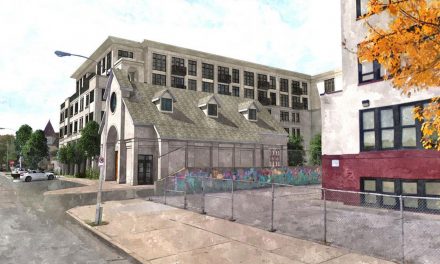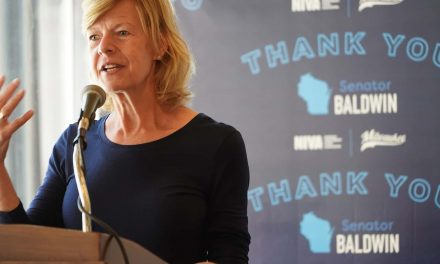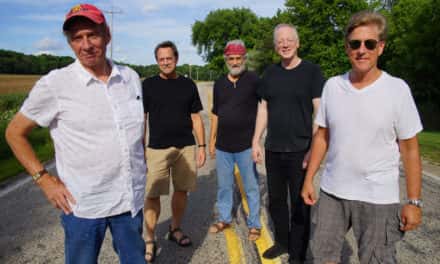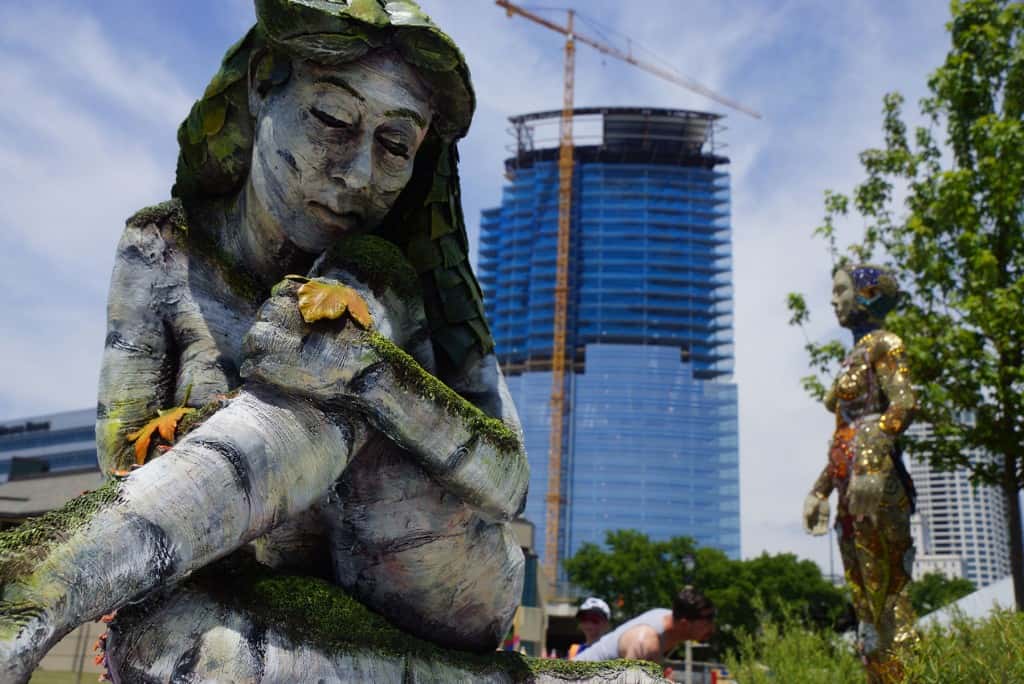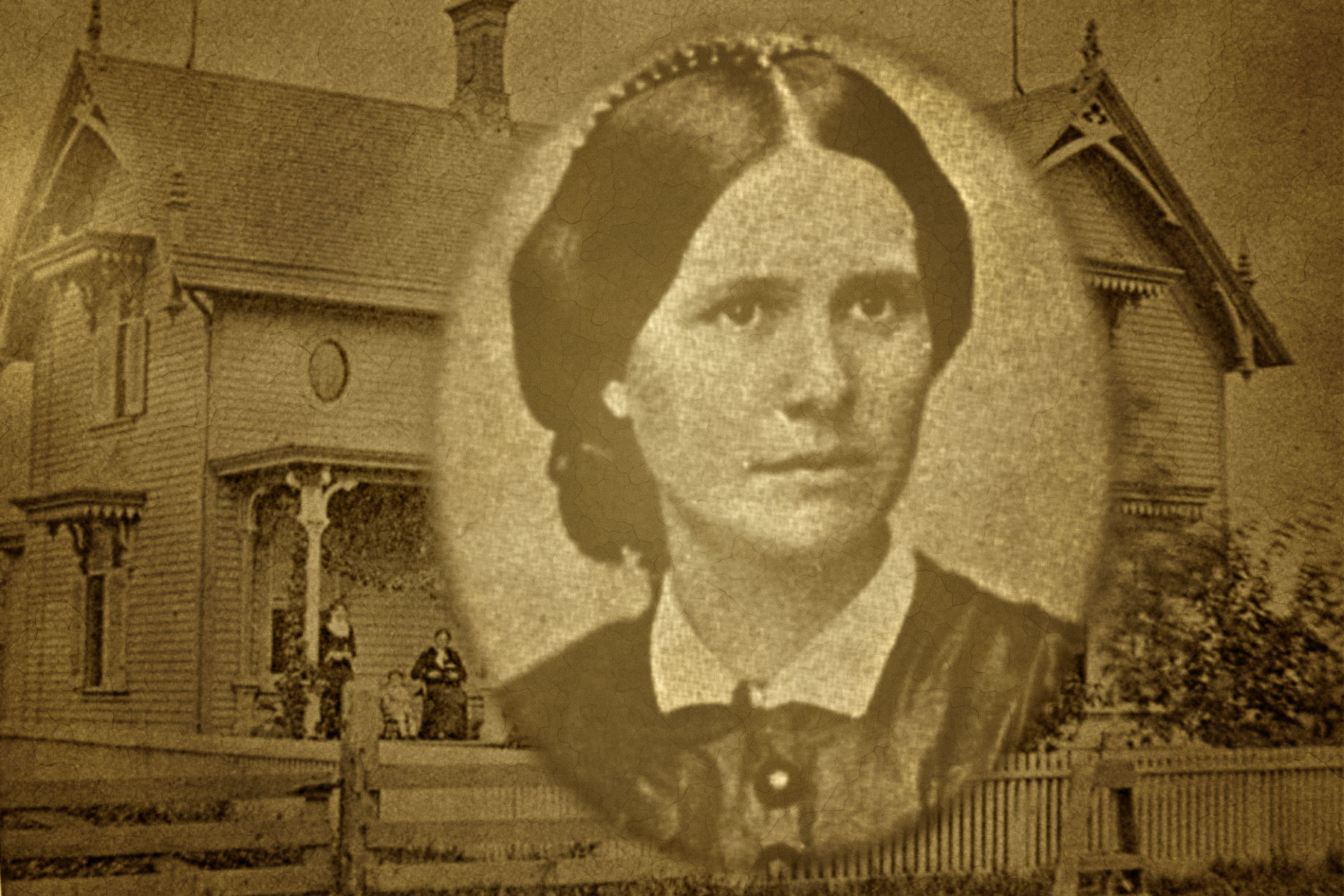
A pioneer of Bay View, Beulah Brinton left her mark on the community with her compassion and humanitarianism and was the 1987 inductee into the Halls of History Museum at Forest Home Cemetery.
She had a free spirit and strong notions about duties to her fellow men, and she carried them out. She was determined and dauntless. It seems that everyone who knew her, admired and loved her for it. I did. She was my great-grandmother.
When I was nine, Beulah Brinton came to live with us. My mother, father, brother, and I occupied the old homestead that she and her husband Warren built in 1870 at 370 Superior (now 2590 South Superior and designated by the Bay View Historical Society as its first historic landmark in 1983). Grandma was living in Chicago, keeping house for her son Warren, but she suffered a slight stroke, and he brought her home to be with us. The year was 1926.
Dressed in black, she seemed rather tall and fragile. “you’d think I was an old woman,” was her caustic comment as she crossed the threshold. She was ninety years young and hated to give up her independence. From that moment on until her death two and a half years later, our lives changed. Everything revolved around Grandma Brinton. Like a magnet, she drew us to her. Even at nine, I felt the power of her personality and religious faith.
People came in droves to welcome Grandma home. Our house was filled with laughter and memories. One couple from Michigan said Grandma had been the only woman with any medical knowledge in their small town. Her kind, soothing hands and prayers had healed the sick. She had been midwife, doctor, and minister to them.
I looked at her veined hands that were shriveled and thin. They appeared to rest comfortably in the lap of her challis dress as she rocked in her old maple rocker. But according to mother, they had also known hard work in the hills of upstate Jay, New York, where she was born on December 12, 1836 and given the name of Bulah Tobey. (The spelling of her name was changed later to Beulah due to popular usage.)
About her childhood, Grandma was once quoted by a reporter for the Milwaukee journal (August 1924) as saying, “In those days people were interested mostly in hard work and making money. They had to be. They didn’t have time to devote to humanity, or to getting acquainted with their fellowman and learning to love the beautiful spirit that lies beneath the flesh. My childhood was not like yours, nor the kind of childhood I would have chosen. I was born in a log cabin and spent much of my early life looking forward to the time when my spirit might be free.”
It was after she met and married Warren Brinton that her dream was realized. Warren was born August 12, 1825 in Salisbury, Connecticut. He was a kind, gentle man with a warm smile hidden under his beard. They were married in Westport, New York on November 27, 1854.
One way to trace their frequent moves to various towns were Warren found work is to know the birthplaces of their children. They were recorded in the family Bible. Their first child, Addie, was born June 24, 1856 in Pittsford, Vermont. After moving to Pilot Knob, Missouri, the Brintons were blessed with another little, Emily, who was to be my grandmother. She arrived on February 4, 1861. At this time they lived in a little dirt-floored cabin, and Grandma kept a garden. Mother told me her hands had known the roughness of the rocky Missouri soil; but when I studied them, they seemed soft, smooth, and comforting, and showed no sign of hard work and blisters.
Better offers and new jobs kept the Brintons on the move. Sometime in 1862 they moved to Wyandotte, Michigan. There another daughter, Beulah, arrived on March 4, 1864, and a son, Warren Dillon, on February 20, 1868. Wyandotte was the seat of the Eureka Iron Works. The company, situated twelve miles from Detroit, was owned by Grandma’s cousin, Captain Eber Brock Ward, who lived in Detroit. It is possible that Warren Brinton was employed at Eureka, for it was Ward who instigated their next move which was to Milwaukee, where Warren became superintendent of the rolling mills in Ward’s Milwaukee Iron Works in Bay View.
Although the Brintons were well-established in Bay View in 1876, their last child, Daisy, was born that year on August 16 in Leland, Michigan, probably while Grandma was visiting relatives. Of their five children, Addie and Beulah died very young; Emily, Warren and Daisy lived to maturity.
Grandma’s first cousin, Captain Eber Brock Ward, not only played an important role in the Bay View community but in the Brinton family as well. He was an industrialist and philanthropist and the wealthiest man in the Midwest of his time. When Ward decided to build on of his steel rolling mills in Bay View, he offered Warren Brinton not only a job but also land on which he could build the family home.
The mill land was purchased from John Ogden in 1866, and Ward acquired other property nearby on which to build houses for the skilled workers he had imported from England, Ireland, Scotland, and Wales. The Italian population was to come later.
By 1870 the firey blast furnaces were lighting up the evening skies along Lake Michigan. The pulsating flames formed the heart of Bay View. That year Beulah and Warren moved into the colonial-styled home they built on the lots Ward had deeded to them. Within easy walking distance of the mill, it stood tall and impressive with its white pillared porch.
Nearby were the cottages built for the workers, puddlers who were skilled in converting or puddling pig iron into wrought iron. Many of these people brought wives and children when they emigrated from Europe. They were lonely and homesick. There was a need for education, medical care, and recreation. For some there was a language barrier. It wasn’t long before Grandma Brinton noted this and decided to do something about it. Making the rounds from door to door, she invited the woman and children to come to her home. She became a familiar figure, a young matron in her thirties, with snapping black eyes, long black hair parted in the middle, and a strong commanding voice. The settlers did as they were bidden and apparently never regretted it. This became clear to me later when those who were still in Bay View, or those who returned to visit, filed into our parlor to greet her and show their gratitude.
Grandma taught them how to cook, to sew, to speak the language, and to care for their babies. Some of the babies she delivered. In her yard, lined with apple trees, she marked off a tennis court and taught the young people to play. Tennis had been introduced in the United States in 1874 and was still new to the City of Milwaukee. Rackets were kept in a box on the back porch. On summer evenings Grandma played the piano while couples danced. Grandma was a staunch champion of youth and their pleasures. She was quoted in the Milwaukee Journal as believing in encouraging pleasures such as theatre attendance and dancing “even in the days when the theatre was considered a den of iniquity and dancing was called the work of the devil.”
At the age on ninety-one she remarked to another reporter, “The young folks are a better lot than their parents or their grandparents if you ask me.”
Guests were always welcome; Grandma’s doors were never locked. On hot, summer days they were invited inside while she read to them. Everyone looked forward to this treat, for there were no books in their homes, no library nearby. One of the visitors who came after Grandma moved in to live with us recalled, “Sometimes as she read to us, she would look up from the page to tell about the wonderful things she believed would come about in the world of science in our lifetime. We thought of these as fairy tales, but they all happened as she had prophesied. She was a century ahead of her time.” (Milwaukee Journal, August 1924.)
Some former mill workers who entered smiling and grateful remembered that Grandma furnished the first library for them, stocking the mill office with her own collection of books. On one occasion when her cousin Ward visited his mill, Grandma apprised him of her need for more books. The lake captain, a shrewd bargainer told Grandma that if she could raise a certain sum, he would double it. It didn’t take long for this determined woman to raise her share. In 1874 her parlor became the first public library in Bay View. The three hundred volumes were in circulation for several years; but as they grew in number it became necessary to transfer them in 1880 to the Milwaukee Library. Then because of duplication, they were shipped back to the site of the present Dover Street School at 619 East Dover Street in Bay View. This building then became the first branch of the Milwaukee Public Library and the first neighborhood library in the city. In June of 1914 they were moved again to the new Llewellyn Library at 907 East Russell Avenue.
Although she called it being neighborly,” Grandma’s work was identical to what was offered later in the settlement houses. It was the forerunner of the University Settlement in New York City founded in 1887 and Hull House, which opened in Chicago in 1889.
Old friends and new friends kept coming, and with each visitor there was always a story to tell. One former neighbor described a fire that had badly damaged a neighborhood flat rented by a family named Tracy. When that happened, around 1905, Grandma was wintering in Chicago. She wrote to the Tracys and urged them to move into her home until their place could be restored. They did. While there, their mischievous little son Spencer (who was born in Milwaukee on April 5, 1900) turned all of Grandma’s pictures to the walls and played havoc with the furniture. I also learned that Spencer Tracy, later to become my screen idol, had been assigned to the bedroom I eventually occupied.
Some of the stories they told resembled small miracles. One time, an old friend related, Grandma gathered the children of Bay View, declaring it was time the community had a park for them to play in. She commanded them to march to the land she had selected. Like the Pied Piper of Hamelin, she strode down the street, children skipping and singing behind her. When they reached the site, they planted a flag and “by faith” took the land from the city as a park. Miraculously, soon after, the City of Milwaukee purchased 15.82 acres and named it the 17th Ward Park. A year later it was renamed South Shore Park. It officially opened in 1910 and several expansions followed.
Another time, explained a visitor, Grandma attended a Ladies Aid meeting at the Trinity Methodist Episcopal Church located at 2772 South Kinnickinnic Avenue (now named Bay View United Methodist Church.) The ladies were discussing a thread-worn carpet on the church aisle. There was no money with which to buy a new one. Grandma, who had been silent, suddenly arose and told the ladies to come with her. She led them into the church and announced, “We are going to tread upon the new carpet ‘by faith.” Up and down the aisle she trod, the women catching her happy spirit. They dispersed filled with a strange satisfaction. From everywhere the money miraculously rolled in. In a few months the new carpet was laid. (In 1984 this same church was designated by the Bay View Historical Society as the second historical landmark of Bay View.)
Grandma Brinton believed in marches and miracles. She was a Methodist by birth but had gleaned what she felt was the best from all religions and developed one of her own. It was joyous, not sanctimonious or solemn.
She was known for her religious verse. But most of her songs and poems also had a philosophical twist. One Milwaukee Journal reporter’s comment was, “Like Ruskin, she pictured the working man as the hope of the world, and living as she did close to the steel mills, she saw him as a mill worker.” Grandma was also the author of two published novels about the Civil War that carried mystical religious themes, Man Is Love (Lippincott and Co., 1873) and Behold The Woman (Bay View Herald Publishing Co., 1887). Besides this, for a short time, she served as editor of the Bay View Herald.
Some of her visitors were men who remembered working for Grandpa Brinton, who was a stocky man with a dark beard and a generous smile. Mother told me he died suddenly of a heart attack in 1895 while resting in his favorite arm chair. After his death Grandma remained in their home but later began to spend the winter months in Chicago with her bachelor son. Warren graduated with honors from Ralston University and was employed by the International Harvester Company. Later he was to be promoted to assistant comptroller of the Chicago office. Her younger daughter Daisy attended Milwaukee-Downer College, became a writer, musician, and teacher, married William Worchester, and moved to Washington, D.C. In 1902, at the age of twenty-six, she came home for a visit. She died there of walking typhoid. Emily, who graduated from Whitewater Normal School, was a teacher, librarian, post-mistress, and, of course, my grandmother. She married Albert Pickard and raised a family. In 1907 her daughter Mabel Pickard eloped to Waukegan with Ira Ray Estes, grandson of Elijah and Zebiah Estes, Bay View pioneers. When their secret marriage was discovered, it was Grandma Brinton who fogave them, told them, “You two young people should be together,” and let them make the Brinton home their own. They were my parents. And that is where my brother Albert and I grew up.
By the time Grandma began to close her home on Superior Street for the winter months to move to Chicago, the desperate needs of the mill workers’ families had been met. Social centers were springing up all over the country. By 1924 there were eleven in Milwaukee alone. That year the recreation department of the public schools decided to turn an old fire barn on St. Clair Street into their twelfth social center. It was situated conveniently in the midst of the foreign settlement near the mills. The apparatus room became a gymnasium and auditorium. Rooms for teaching household arts, cooking, washing, and the care of infants were provided on the second floor. Horse stalls became marble showers.
The people of the community named the center. Headed by the director, Henry H. Otjen, a Bay View attorney, they asked that it be called Beulah Brinton after their benefactor.
Grandma Brinton came from Chicago to attend the opening ceremony and to present an American flag. At eighty-nine he spoke in a clear voice, her black eyes still sparkling, her white hair still parted in the middle and worn in a neat bun in back. Her good friend, Dorothy Enderis, then head of the recreation department, told of many wonderful things Grandma had accomplished, such as establishing a newsboys’ home in Detroit and organizing the women in Bay View after the Chicago Fire of 1871 to bake and cook and collect clothes. Theirs had been the first shipment to arrive to that destitute city.
Others spoke of Grandma’s loyalty to the Methodist church and how she took the minister’s place when he was absent. One said, “She could preach a sermon as well as she could bake a pie.”
Someone commented on having attended Grandma’s classes. “Today when I hear of some supposedly new point of view with relation to thought transference or the conscious and subconscious mind, I realize that Mrs. Brinton had told us about it years ago. When I was a girl, her philosophy seemed remote and vague. Today I know that she simply was advanced.”
Everyone agreed that Grandma Brinton believed the solvent for the ills of creation to be love. Love and goodness and beauty were her constant themes. I was there for the ceremony. I remember feeling proud when the audience applauded and applauded.
Besides the Social Center, which was torn down years later and replaced in 1981 with the new beautiful Beulah Brinton Community Center at 2555 South Bay Street, there were other namesakes, Beulah Avenue (now South Shore Drive) and the Beulah Brinton Playground on Wentworth Avenue (now gone). Her dedication to the community she loved was memorialized in these landmarks in Bay View. The work of this lady with a social conscience and a generous heart has not been forgotten by the citizens of the area.
It was Grandma who first taught me to enjoy writing. At her bedside, while mother unpinned and combed her long white hair, she and I would compose verses to hymns such as “Jesus Loves Me”
Grandma was becoming blind. Sometimes we would sit on the swing on the front porch, rocking gently as I read to her. The selections were often from the Christian Science Journal or the teaching Baha’u’llah. Grandma never complained about my stumbling sentences, or mispronounced words. Sometimes we just talked; most of the time, she listened.
My playmates loved to visit Grandma. Once we gathered for a lively discussion of what we would like to be when we grew up. Some said” a movie star,” “and opera star,” “a cow girl.” When she finally got to me, I said, “an ordinary woman like my mother,” and Grandma smiled a pleased smile.
On Sunday evenings, we gathered in the parlor, family, neighbors, and other friends for prayer meetings. After songs and prayers, Grandma recited whole chapters from the Bible. At the end as we sang “God Be With You ‘till We Meet Again,” we sent a silent blessing to the world. Grandma believed if enough people would pray for peace simultaneously, our prayers would be answered. It was the unity of minds theme which would bring about the unity of peoples. A letter from her friend, Congressman Victor Berger in 1924 read, “If there were only enough Mrs. Brintons there surely would be ‘Peace on Earth Good Will To Men.”
One noon we were seated around our carved oak kitchen table. Grandma was drinking coffee. The amber beads around her neck had gathered the sunlight and appeared warm inside. Suddenly Grandma’s left arm dropped, the cup fell from her hand and crashed on the floor. For the first time I saw Grandma look frightened. “What have I done?” she said. Her mouth was slanty. I sat frozen.
Mother reached across the table and tugged at Grandma’s left arm. It swung back limp and lifeless. She cried, “Grandma, don’t forget your faith”
Grandma stopped trembling. The fingers of her left hand began to curl inwards. The wrist bent up. The arm moved below her elbow. Little by little through the sheer faith of Grandma Brinton, the whole left arm began to raise. Up it went until it stood straight as a die, fingers pointing to heaven. Grandma said, “By faith, I lift up my arm to God.” Then it fell back to her side useless. I knew I had just witnessed one of Grandma’s little miracles.
It was 1928. Grandma died a few months later in the bed set up for her in our dining room. It was evening. Everyone was gathered around her bed except me. It was late and I had been sent upstairs. I lay there lonely and frightened. Tears kept running down my cheeks. I loved her so.
It was a long time before I finally fell asleep. And when I awoke the house was silent. From then on there was an emptiness that never entirely went away. But I am so grateful for those precious moments I shared with my great-grandmother Beulah Brinton.
Daisy Estes Kursch, Great-granddaughter of Beulah Brinton (1987)
The Bay View Historical Society was established in 1979 to preserve the character and heritage of the neighborhood of Bay View in Milwaukee, Wisconsin.

